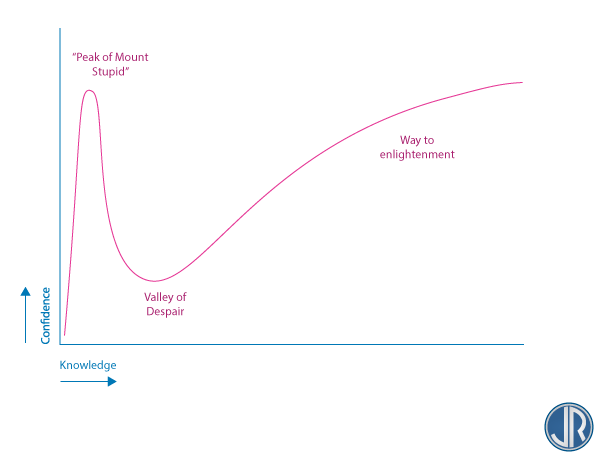Why do I suffer from the impostor syndrome? Study of the Dunning–Kruger effect
70 percent of the population may suffer from the impostor syndrome - what is it, how do you explain it and how to overcome this phenomena? That's precisely what we review in this article.

At some point in your life or career, you may encounter the Impostor Syndrome. This psychological experience where you believe to be a fraud, fooling people with an expertise you do not have or a job you do not deserve is actually more common than you may think.
A study published in 1978 by the psychologist Pauline Rose Clance and the professor of psychology Gail Matthews, states that 70% of the population has, at least once, experienced the Impostor Phenomena.
When facing this situation, you tend to lack confidence and eventually miss opportunities to grow. Your biggest fear is for people to realize that you may not be who they believe you to be and call you out for what you really are. This fear often arises after a promotion or your start in a new job and could last for a long period of time.
Luckily, once you understand why you may experience this situation, it becomes easier to control it.
The Dunning-Kruger Effect

Have you ever noticed how sometimes tasks seem incredibly simple from an outsider's perspective? How you may get frustrated to see others take a long time to fix something that seems obvious and straight-forward?
It often is because things are not as simple as you may think in the first place, because you do not know all the elements of complexity required.
Let's take a simple example: launching a new marketing campaign.
From an outsider's point of view with limited knowledge of the topic, it may just about spending some dollars on Adwords to collect leads, nothing complex!
But if you are an insider with more experience on this subject, on the other hand, you know you need to have a strategy, select the buyer personas, prepare your budget, set your KPIs, define your message, create your ads and your visuals, analyze potential keywords, set a proper landing page, define your flows, etc. Easier said than done!
These two very different perspectives are well defined by the Dunning-Kruger effect. The social psychologists David Dunning and Justin Kruger published in 1999 a study showing that the confidence you have in a specific topic doesn't grow in a linear way, but instead follows a very specific curve that explains that difference of perspective we often observe.
A person with no knowledge whatsoever on a given topic cannot estimate what it takes to manage it.
On the other hand, a limited knowledge tends to give people an excessive amount of confidence in their ability to deliver (defined as the "Peak of Mount Stupid" - my limited knowledge makes me believe it is easy and straight-forward). As the knowledge of that specific matter grows, the understanding of the underlying complexity becomes more obvious and with it falls the confidence level (valley of despair).
Overtime, the level of confidence builds up again with a stronger understanding of the overall topic and what is required to master it (path to enlightenment).
If we go back to the previous example: an outsider who's never heard of marketing campaigns would have no idea about what it takes and therefore have no confidence in managing it. An amateur, however, who knows what a marketing campaign is but never managed one himself would believe it is easy and have a high level of confidence in his ability to deliver.
A more experience marketer may lose his confidence because of this knowledge he has of the complexity behind it. But as the knowledge increases with the experience, this confidence builds up again.
The impostor syndrome is an immediate consequence of this effect: people who know less than you have a vision of your work that is simplified. You, on the other hand, tend to lack confidence because you know how complex things can be. The mix of these two elements give you the impression that you are a fraud and someone may notice that you are fooling people, anytime.
The good thing is that this effect shouldn't last. As you grow and learn more, you get out of the Valley of Despair and your level of confidence should grow back and erase that feeling of being an impostor.
The Sphere of Pascal

Another concept I love to take as an example is the Sphere of Pascal.
Blaise Pascal was a French mathematician of the 17th century. In "Pascal et la Sphère Admirable", Pascal takes the example of a sphere to explain what the human knowledge really is.
Vulgarized, this concept can be explained as follow: take a sphere to represent your knowledge. By extension, everything outside this sphere is the unknown. As a result, the surface of that sphere that is in contact with both entities represents what you know you don't know (your awareness of the unknown).
As you grow and accumulate new knowledge, your sphere grows, so does the surface of your sphere. The more you know, the more you are aware of the things you don't know. Basically, the more you know, the more you know you don't know. And that can be a scary process, because it never ends: the more things you learn, the more you realize how little you actually know.
This concept also perfectly explains why the impostor syndrome exists: the more knowledgeable you get, the more humble you become in front of the infinity of your ignorance. It is just a matter of accepting that being good at your job doesn't mean knowing it all, but mastering what is required of you.
Managing your impostor syndrome
We've established that you may have an impostor syndrome, like 70% of the population.
We've established that this syndrome is usually the result of a deeper understanding of a specific topic that may not be perceived by others.
We've established that the more you learn, the more you are aware of your lack of knowledge.
With that in mind, you can now change your own perspective, trust yourself more, be more confident in your own ability and realize that the situation you are in today is not just luck. Specific events and achievements brought you where you are, and a lot of it comes from your own work. Let go of your impostor syndrome, remain humble, and remember that 7 people out of 10 may feel the same way as you do.
"Fake it till you make it!"
Once you're done with your Impostor Syndrome, you may want to either "Reconsider your current career path" or "Learn how to get started with your personal branding".
Last update: 2024-04-24 Tags: career job dunning kruger impostor pascal salary personal branding
















 Français
Français English
English